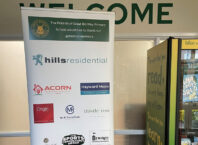A renowned toxicology expert from the University of Hertfordshire has received a Member of the Most Excellent Order of the British Empire (MBE) for his services to national security in King Charles III’s Birthday Honours.
Professor Rob Chilcott, who led the groundbreaking work that shaped emergency protocols involving exposure to toxic chemicals, worked at University of Hertfordshire from 2008 until his retirement in 2025 and retains an Emeritus position at the University.
The honour – the third highest ranking Order of the British Empire award – recognises efforts led by Prof Chilcott’s research group to protect civilians from the health effects of highly toxic chemicals such as chemical warfare agents and industrial chemicals.
This pioneering research from Herts’ Centre for Topical Drug Delivery team and Toxicology transformed how emergency services in the US and UK respond to chemical attacks, following a series of studies that revealed traditional decontamination methods may do more harm than good.
The team, which also included Dr Hazem Matar and Dr Joanne Larner, found that showering casualties while they are still clothed can drive toxic chemicals deeper into the skin.
This led the researchers to develop a new “disrobe and dry decontamination” approach, which removes up to 99% of contaminants before any water is used. A large-scale, multi-agency exercise in Rhode Island, dubbed “Operation Downpour”, demonstrated the effectiveness of the new methods, involving hundreds of volunteers and emergency personnel.
The findings were subsequently adopted into national emergency protocols on both sides of the Atlantic and were used during the 2018 Salisbury nerve agent attack.
The procedures are now part of routine training for UK emergency responders and are embedded in a mobile app used by first responders across the US.
Professor Chilcott’s team also collaborated with Public Health England (which has since been replaced by UK Health Security Agency) to identify dry decontamination techniques using materials readily available in NHS settings.
Their research has been published in open-access medical journals and cited in UK parliamentary evidence on national preparedness for chemical, biological, radiological, and nuclear (CBRN) threats.
A Home Office official said that the work led by Prof Chilcott and his team was “fundamental, not only in the area of mass decontamination but also in the ability of local emergency teams to effectively respond to individual chemical assaults using corrosive materials”.
The US government’s Biomedical Advanced Research and Development Authority (BARDA) and the UK government’s Department of Health and Social Care, which funded the research, said that while “effective decontamination is the best way to protect health against chemical exposure and is the only generic medical countermeasure available against multiple chemical threats”, there “was no standard, scientifically supported practice for performing it in the United States before BARDA asked the University of Hertfordshire to undertake rigorous studies.”
In 2018, the work led by Prof Chilcott was awarded Research Project of the Year: STEM in the Times Higher Education Awards, which recognises innovative research in STEM subjects that has a far-reaching impact.
A global authority in the field, Prof Chilcott has also made numerous broadcast appearances, written several articles on chemical contaminants and given evidence at inquests relating to various forms of poisoning.
He is also the co-author of the book Principles and Practice of Skin Toxicology, alongside Shirley Price, Emeritus Professor at the University of Surrey, which is a comprehensive and authoritative guide on the science and application of skin toxicology.
Commenting on the award, Prof Chilcott said: “I am deeply honoured to receive a King’s Honour in recognition of the work my colleagues and I have undertaken in responding to incidents involving exposure to toxic chemicals.
“This award reflects the significant international contributions of the University of Hertfordshire’s Toxicology Research Group in delivering high-quality, evidence-based scientific support to government departments and agencies responsible for the safety and security of the UK and its allies.”




